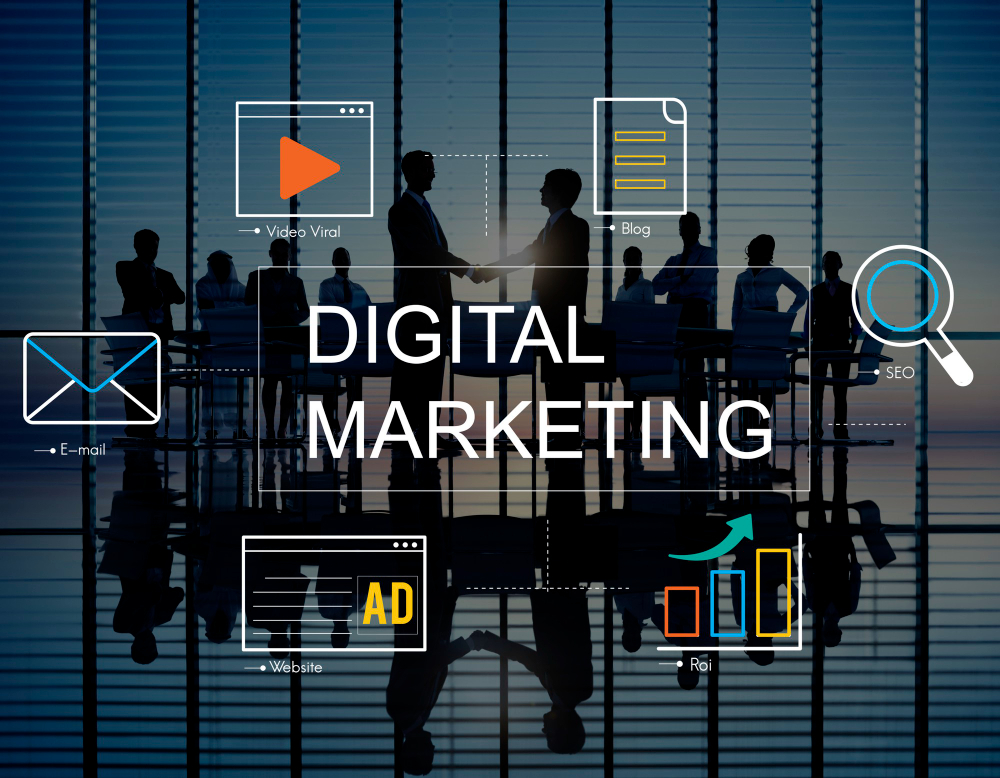Unlocking the Power of Digital Marketing: Top 10 Benefits
In today’s fast-paced digital landscape, businesses are increasingly turning to Digital marketing to stay ahead of the competition and reach their target audience effectively. From small startups to large corporations, leveraging the benefits of digital marketing has become essential for success.

Let’s delve into the top ten advantages that this dynamic strategy offers:
Enhanced Brand Visibility
With Digital marketing techniques such as search engine optimization (SEO) and social media marketing, businesses can boost their online visibility, ensuring that their brand remains at the forefront of consumers’ minds.
Targeted Audience Reach: Unlike traditional marketing methods, digital marketing allows businesses to precisely target their audience based on demographics, interests, and behavior, resulting in higher conversion rates and ROI.
Cost-Effectiveness
Digital marketing offers a cost-effective alternative to traditional advertising channels such as television or print media, allowing businesses of all sizes to allocate their marketing budget more efficiently.
Measurable Results
One of the most significant advantages of digital marketing is its ability to provide real-time analytics and performance metrics, enabling businesses to track the effectiveness of their campaigns and make data-driven decisions.
Improved Customer Engagement: Through platforms like social media and email marketing, businesses can engage with their audience in meaningful ways, fostering stronger relationships and building brand loyalty.
Greater Flexibility
Digital marketing offers unparalleled flexibility, allowing businesses to adapt their strategies quickly in response to changing market trends and consumer behavior.
Global Reach
With the internet connecting people worldwide, digital marketing enables businesses to expand their reach beyond geographical boundaries, tapping into new markets and opportunities.
Enhanced Personalization
Through data-driven insights, businesses can tailor their marketing messages and content to resonate with individual consumers, delivering a more personalized and relevant experience.
Increased Lead Generation
Digital marketing strategies such as content marketing and email campaigns are highly effective in generating leads and nurturing prospects through the sales funnel.
Competitive Advantage
By staying ahead of the curve with innovative digital marketing strategies, businesses can gain a competitive edge in their industry, positioning themselves as industry leaders and driving sustainable growth.
Digital marketing offers a plethora of Analytical advantages that traditional marketing methods simply cannot match. From real-time data tracking to precise audience targeting, the insights provided by digital marketing analytics empower businesses to make informed decisions and drive success. Let’s delve into the analytical advantages of digital marketing and explore how they can benefit businesses of all sizes.

Harnessing Data Insights for Strategic Growth
In the realm of digital marketing, data is king. Unlike traditional marketing channels, which often rely on guesswork and assumptions, digital marketing platforms provide robust analytics that offer valuable insights into consumer behavior, campaign performance, and ROI. Here are some key analytical advantages:
Real-time Tracking: Digital marketing allows businesses to track the performance of their campaigns in real time. Whether it’s website traffic, email open rates, or social media engagement, marketers can monitor key metrics instantly and make adjustments on the fly to optimize results.
Audience Segmentation: Digital marketing platforms enable precise audience segmentation based on demographics, interests, and behavior. By analyzing data on consumer preferences and purchasing habits, businesses can tailor their marketing messages to specific audience segments, increasing relevance and effectiveness.
Conversion Attribution: Attribution modeling in digital marketing allows businesses to accurately track the customer journey and determine which channels and touchpoints are driving conversions. This insight enables marketers to allocate budget and resources more effectively, focusing on the channels that deliver the highest ROI.
Predictive Analytics: Advanced analytics tools utilize machine learning and predictive modeling to forecast future trends and outcomes. By analyzing historical data and patterns, businesses can anticipate consumer behavior, identify potential opportunities, and stay ahead of the competition.
Maximizing ROI with Performance Metrics
One of the primary goals of any marketing campaign is to achieve a positive return on investment (ROI). Digital marketing analytics provide marketers with the tools they need to measure, analyze, and optimize campaign performance to maximize ROI. Here are some key performance metrics to consider:
Cost per Acquisition (CPA): CPA measures the cost of acquiring a new customer or lead through a specific marketing channel. By tracking CPA across different channels and campaigns, businesses can identify the most cost-effective strategies for acquiring customers and allocate budget accordingly.
Return on Ad Spend (ROAS): ROAS measures the revenue generated from advertising relative to the cost of the advertising campaign. By calculating ROAS, businesses can determine which advertising channels and campaigns are driving the highest revenue and adjust their strategy accordingly.
Click-Through Rate (CTR): CTR measures the percentage of people who click on a specific link or ad out of the total number of people who view it. A high CTR indicates that the ad is resonating with the target audience, while a low CTR may indicate the need for adjustments to the ad creative or targeting.
Conversion Rate: Conversion rate measures the percentage of website visitors who complete a desired action, such as making a purchase or filling out a form. By optimizing conversion rates through A/B testing and continuous refinement, businesses can increase the effectiveness of their digital marketing efforts and drive more conversions.
Customer Lifetime Value (CLV): CLV predicts the total revenue a customer is expected to generate over the course of their relationship with a business. By understanding the CLV of different customer segments, businesses can tailor their marketing strategies to focus on acquiring and retaining high-value customers.
One of the key advantages lies in the detailed insights provided by digital analytics tools. These tools track various metrics such as website traffic, conversion rates, and customer demographics in real-time, enabling marketers to gain a deep understanding of their audience’s behavior and preferences. By analyzing this data, businesses can tailor their marketing efforts to better resonate with their target market, ultimately driving higher engagement and conversion rates.
Furthermore, digital marketing allows for precise targeting capabilities that traditional forms of advertising lack. Through techniques such as audience segmentation and retargeting, marketers can deliver personalized messages to specific groups of consumers, increasing the relevance of their campaigns and improving overall ROI.
Another noteworthy advantage is the ability to measure ROI with greater accuracy. Unlike traditional marketing methods where tracking ROI can be challenging, digital marketing offers robust measurement tools that attribute conversions directly to specific marketing initiatives. This not only helps businesses allocate their marketing budget more effectively but also provides valuable insights for future campaign optimization.
In conclusion, the analytical advantages of digital marketing have transformed the way businesses approach their marketing efforts, offering unparalleled insights and measurability that drive success in today’s digital age.
This Article is written by Amar kivade , If u want to create website and to learn about content writing please the fill form here